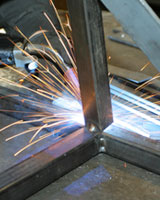Fabrication Jobs FAQs
There are many fabrication jobs FAQs related to this growing and exciting career field. There are opportunities available in a wide variety of sectors. The majority of fabrication jobs in the United States are related to platework and metal structures. In this sub-specialty, fabrication jobs FAQs state that fitters and fabricators will install, fit and assemble metal components that are used in pressure vessels, boilers, towers, tanks, bridges and buildings. Most employment opportunities are provided by shipbuilding companies, heavy machinery manufacturers, platework fabrication plants, boiler plants and structural steel plants.
Fabrication Jobs FAQs: Job Titles
An individual who works in this sector may be given one of the many titles according to their skills and duties, such as:
- Structural steel fitter
- Steel fabricator
- Shipfitter apprentice
- Shipfitter
- Platework fitter
- Plater
- Metal fabricator.
Fabrication Jobs FAQs: Duties and Responsibilities
There are many duties and responsibilities required by fabricators in this specialty. They must study blueprints and engineering drawings as well as construct templates and patterns. Workers will also need to move, hoist and rig heavy materials throughout the job site. In addition, metal plates and sections must be fitted and assembled by utilizing methods such as riveting, welding and bolting. During the final production phase, fabricators will install certain components. These duties are performed by using a wide array of tools and machines, which include shears, brake presses, grinders, cutting torches and drills. CNC equipment is also commonplace and used to cut, bend, punch, form and drill metal pieces.
Fabrication Jobs FAQs: Career Outlook and Salary Information
Over the next 10 years, there will be an excess supply of jobs to workers in the fabrication industry. This means there will be more qualified applicants and not enough job opportunities to go around. Even so, there is expected to be a growth in jobs; the growth in qualified applicants will increase along with the opportunities. However, there are other fields where people with fabrication training can transfer their existing skills. By the end of the decade, there will be approximately 1810,800 job opportunities in the United States' fabrication industry.
The 2010-2011 Occupational Outlook Handbook of the U.S. Bureau of Labor Statistics states that platework fabricators and structural metal fabricators can expect to earn an average hourly wage of $14.39-$27.03 USD. The average wage for all fabrication specialists equates to $19.37 USD. Workers can earn more after learning additional job skills and gaining more career experience.
Fabrication Jobs FAQs: Employment Requirements and Certifications
Regardless of the occupation, there are certain prerequisites and requirements applicants must meet. A secondary education is always required by fabrication employers. Although some industries provide a 3-4 year-long apprenticeship in lieu of formal training, most employers request that applicants take courses in platework and steel structural fabrication. A post-secondary education is needed for certification.
Although most states in the U.S. consider fabrication certification to be voluntary, it is beneficial for prospective employees to obtain. Certification can enable fabricators to find employment in specialized fields. Metal fabrication certification can be obtained through the Fabricators & Manufacturers Association, International. Other organizations in the U.S. provide certification in different fabrication specialties.

